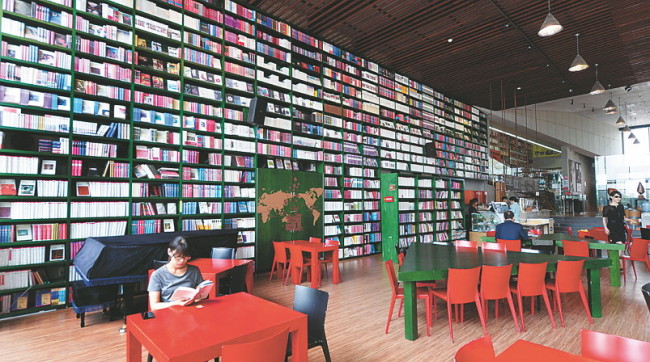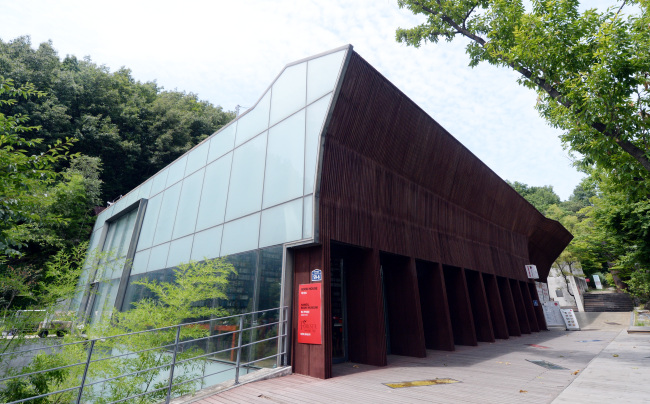Korea’s oldest bookstore in Seoul, Jongno Books, was a landmark in terms of numbers of customers and its symbolic significance as the trove and exchange of knowledge.
The five-story bookstore was the only large bookstore in Seoul until Kyobo Book Center opened in the 1980s. It was also a popular meeting spot where people browsed books while waiting.
Since the 1980s, two new large bookstores, Kyobo and Youngpoong, mounted a tough challenge to Jongno Books, taking a large chunk of its customers, and consequently, its profits. In 2002, the 95-year-old bookstore closed its doors.
The demise of Jongno Books more than a decade ago may serve as a mirror to the future of bookstores now.
Like Jongno Books faced competition with newcomers with fresh concepts, today’s bookstores face an unprecedented threat from the new breed of online sellers who offer huge discounts.
“Independent bookstores failed to survive in the price war against giant online retailers. Bookstores play an important role in local communities as a center of cultural activity. If they continue to disappear, readers will also lose the opportunity to find good books as well,” said Park Dae-choon, chairman of the Korea Federation of Bookstore Associations, in an email interview.
The number of bookstores dropped 33 percent in a decade from 3,489 in 2003 to 2,331 in 2013, according to the federation. The surveyed bookstores sell books only, doing no other business.
Most of the closures happened in rural areas and small cities. The result is: Four counties in Korea now do not have a single bookstore: Ongjin, Yeongyang, Ulleung and Cheongsong. There are 36 cities and big counties with one bookstore, including Uiwang and Moongyeong cities.
“It could be considered another business closing, but it means a whole neighborhood loses a chance to read books. Having a bookstore in a neighborhood is a huge cultural benefit and blessing,” said Park. “It’s urgent to take immediate action to this dire situation.”
Price war, dwindling demand The government revised a publishing industry law in 2002 to give sellers a free rein in marking down old titles ― those released more than 18 months ago ― while setting a cap of 10 percent on new releases.
Online retailers began to jump in the book market around 2009 and racked up huge profits in their first business year, making a big dent in the sales of small and mid-sized brick-and-mortar bookstores.
Since then, it has become a common practice for bargain-hunting consumers to browse books at neighborhood bookstores, write down titles or take snapshots of book covers and order them online later.
While sales at small stores went downhill, online sales grew rapidly. Online sellers saw an average annual growth of 16 percent until 2010. Since then, the whole bookstore industry ― be it online or offline ― has been in the doldrums.
The price competition, led by online retailers, played a part in the industry’s downturn, coupled with broader issues such as Koreans’ dwindling reading habits and the arrival of Kindle and other digital reading platforms, industry insiders say.
The bookstore industry got caught in a vicious circle, as the more sellers cut margins, the bigger their combined losses became.
Some expect a shot in the arm from another revision of the law, due this November, which will limit discounts for old titles at 15 percent.
“The revised law will help physical bookstores by narrowing the price gap between online and offline bookstores,” said Park.
However, some experts point to a more fundamental challenge facing the industry: Koreans buy fewer books, regardless of the discounts.
According to the Ministry of Culture, Sports and Tourism, Koreans each read 9.2 books in 2013, down 2.7 books from 2008.
The amount a household spends on books fell 47 percent from 31,934 won in 2003 to 16,878 won in 2013. Expenses for other entertainment and leisure, on the other hand, soared 35.7 percent from 100,000 won to 135,100 won in the same period.
Then, there is a threat coming from overseas.
American online behemoth Amazon is preparing to enter the South Korean market, posing a great threat to both online and offline retailers here.
“We can’t compete with each other or with Amazon by lowering book prices any more. There needs to be a protective move like the French government did recently to protect local bookstores against Amazon,” Park said. France passed an anti-Amazon law in June to prevent online retailers from offering free shipments of discounted books, a move to protect thousands of local bookstores.

Visitors read books at Foresta, a book cafe run by the publishing company Hangilsa in Paju, Gyeonggi Province. Book cafes have emerged as an alternative to disappearing neighborhood bookstores, attracting visitors looking for a quiet and relaxed place to read books. (Park Hyun-koo/The Korea Herald)
For readers, book cafes are emerging as an alternative to local bookstores.
Customers browse books and buy books in book cafes like they do in bookstores. But book cafes are different from traditional bookstores as they serve as coffee shops, art galleries and as a cultural space. Book cafes can be found around the Hongdae area in Seoul and Paju Book City in Gyeonggi Province, which is a cluster of hundreds of publishers.

The exterior of Foresta (Park Hyun-koo/The Korea Herald)
Foresta run by Hangilsa is a popular book cafe in Paju where people come for the cultural experience. It is a space combining a bookstore, a cafe, an art gallery and a children’s play zone all in one building. People can read books in the spacious cafe on the first floor. They can always buy them at a bookstore. The children’s play zone in the basement offers children’s activities that involve books and art.
“It’s a space where customers can read books in a relaxed setting like they do in old neighborhood bookstores,” said Kim Hee-jun, manager of Foresta.
“Here each space functions organically. They have different roles, but create cultural synergy. People can meet diverse books, experience enriching cultural experience at the art gallery or just casually enjoy soft drinks while they read,” he added.
By Lee Woo-young (
wylee@heraldcorp.com)







![[KH Explains] How should Korea adjust its trade defenses against Chinese EVs?](http://res.heraldm.com/phpwas/restmb_idxmake.php?idx=645&simg=/content/image/2024/04/15/20240415050562_0.jpg&u=20240415144419)